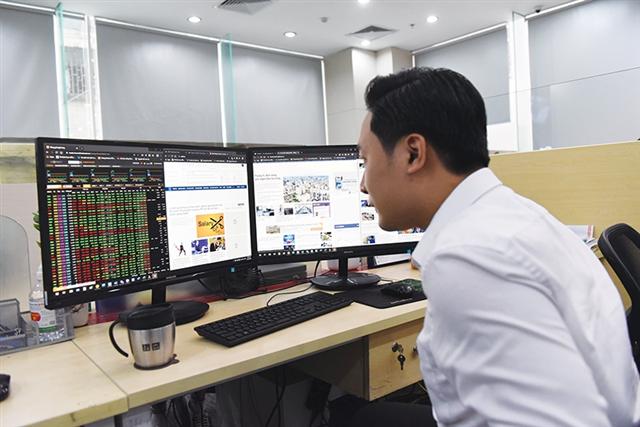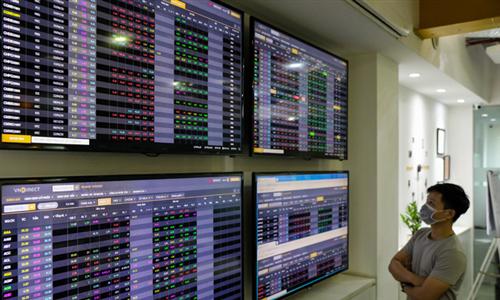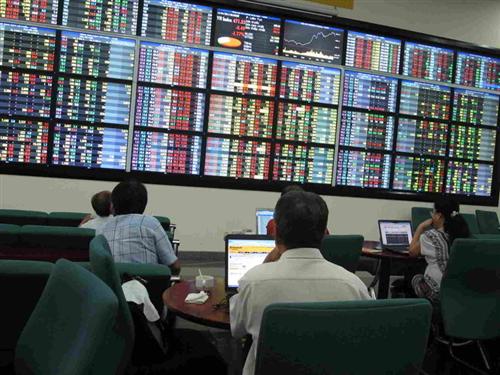Positive market signs emerge for Vietnam’s grand reopening
Positive market signs emerge for Vietnam’s grand reopening
Instead of adopting the age-old “sell in May and go away” strategy, and focusing on months with traditionally stronger market growth, investors now could be more bullish about a stock rally, buoyed by optimism about a gradual reopening of businesses.

Traders are advised to stay cautious instead of following traditional market moves in May, Photo: Dung Minh
|
Market uncertainties sparked by the COVID-19 pandemic have led to an abrupt end of the bull market, leaving investors’ confidence plummeting through multiple selling sessions.
However, the unprecedented outbreak could set the stage for positive recovery signs. Some sectors that will benefit the most include e-commerce, retail, insurance, healthcare, aviation, and construction.
The current low oil price is acting as a boon for e-commerce retailers to upgrade their last-mile delivery services – one of the key catalysts to match customer satisfaction. Although weak demand will likely hurt retailers to some extent, experts believed that the low oil price may boost sales volumes by enabling more free shipping promotions or even same-day deliveries.
Notably, some brick-and-mortar players are developing their own omnichannels to catch up with e-commerce peers, such as Mobile World Investment Corporation, Masan Group, and VinCommerce. Experts also believed that supporting companies such as FPT Corporation, CMC Corporation, and Viettel Post will be given the green light to thrive.
Meanwhile, the government has banned exclusive COVID-19 insurance packages, taking one profitable business from insurers. However, they are now rolling out new and innovative products to weather the storm stemming from the pandemic.
Last year was the sixth in a row in which Vietnam’s insurance market witnessed a premium growth rate at over 20 per cent per annum. Hence, investors could opt for insurers due to their substantial potential down the road. Some market movers to watch include Bao Viet Holdings, PetroVietnam Insurance, BIDV Insurance, and Vietnam National Reinsurance.
Besides this, the demand for healthcare protection has surged dramatically during the crisis, leading to some investors betting big and believing in the defensive nature of those firms.
“Although we do not expect that the pandemic will create a strong growth trend in personal care in the long term, such high demand will likely continue as consumers are used to practising good personal hygiene,” noted researchers at KIS Securities. “For example, traders should keep an eye on LIX Detergent which is seeing a bullish breakout since the end of March”.
As VIR reported previously, the government has announced shifting eight expressway projects towards public investment, which might enforce appetite for construction stocks.
Hoa Phat Corporation (HPG) seems to be a prudent choice, as investors would bet big on Dung Quat Steel Complex to be a recipe for success of HPG, as well as a game-changer for the entire domestic steel market.
“When the two phases of Dung Quat Steel Complex are completed, HPG will shorten the delivery time to Vietnam’s southern region from seven to three days, which could help the company achieve its 35-40 per cent market share target,” said Tran Ba Trung, analyst at VNDIRECT.
Furthermore, firms providing construction stones will also receive much attention.
On the other hand, Vietnam’s lifted social distancing restrictions have drummed up support for non-essential services to re-open – explaining the recent rally of stocks like Sabeco and Habeco.
Also, the Ministry of Transport removed restrictions on the frequency of domestic flights and passenger distancing, calling for the restart of international flights, which would smooth the path of groups like Vietnam Airlines and Vietjet.
In April, trading value remained flat at average VND4.3 trillion ($187 million) per session on Ho Chi Minh City Stock Exchange but in terms of volume and liquidity saw jumps thanks to low stock prices. Around 285 million shares changed hand in each session in April, the all-time high, showing a strong bottom-fishing demand.
“Seasonal effects will be likely ineffective this year and we don’t recommend investors to not go short in May. Instead of a correction, we expect an upward sideways month ahead thanks to new local money,” said Hieu Tran, analyst at KIS Securities.
|
The Ministry of Finance has proposed raising the 5 per cent capital ceiling on lending for securities purchases at banks, thereby easing the listing requirements for foreign-invested enterprises – a move to cushion the domestic economy. Other measures include extending the deadline for annual stakeholder general meetings for another three months to September 30 and reducing the approval time for treasury stock buybacks to one or two days from seven days as previously. |


























